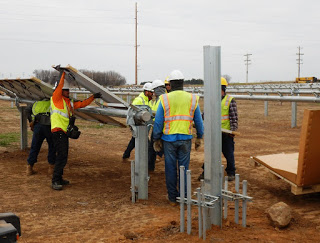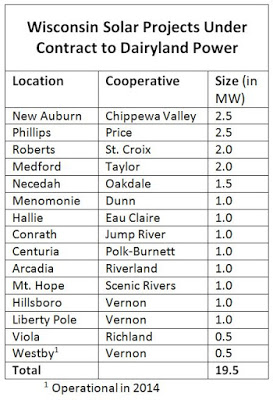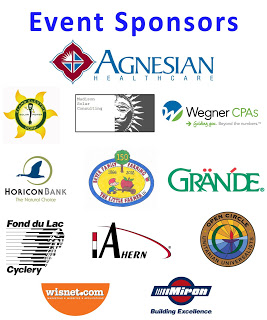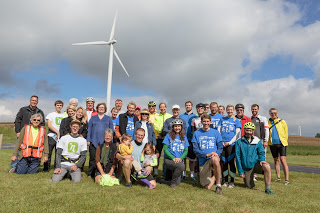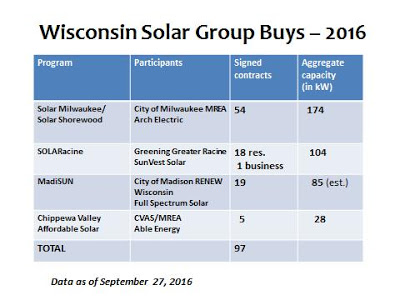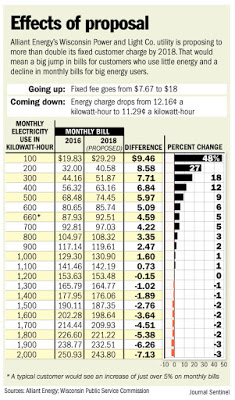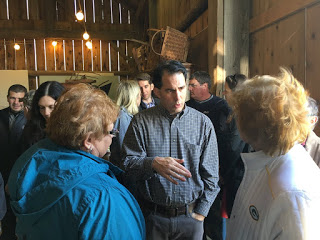
by jboullion | Nov 18, 2016 | Uncategorized
For immediate release
November 18, 2016
More information
Tyler Huebner, Executive Director
608.255.4044
tyler.huebner@renewwisconsin.org
 |
Governor Scott Walker at Heritage Farm in Kewaunee,
with RENEW’s Tyler Huebner in the background. |
Yesterday, RENEW Wisconsin was in the audience as Governor Scott Walker announced the State of Wisconsin’s intention to invest in biodigesters that will turn dairy
manure into renewable energy while assisting with improvements in water
quality.
Governor Walker announced that the Public Service Commission, Department of Natural Resources, and Department of Agriculture, Trade, and Consumer Protection are working together to deliver a Request for Proposals in January 2017. The request for proposals will allow private firms to submit bids to meet the goals and specifications set out by the agencies.
A major goal of the initiative is to aid with water quality problems in environmentally sensitive areas of the state, and the announcement was made in Kewaunee, one of those regions. Governor Walker indicated that this initiative is one of a series of steps, and not in and of itself the only solution, needed to aid water quality in Kewaunee County.
Wisconsin is the national leader in deploying biodigesters, also known as anaerobic digesters, on farms. We have 34 farms with digesters in Wisconsin. These systems turn cow manure into solids, liquids, and methane, which is an energy resource that is the primary component of what we commonly call “natural gas.”
In many of the digesters on farms in Wisconsin today, the methane is cleaned and passed through a generator to create electricity, which is sold to the local power company. Most of these digesters are located right on the premises of the dairy farms.
The system envisioned by the Governor’s announcement, according to a recent interim order from the Public Service Commission, might collect manure from farms of all sizes, and process it in a centralized biodigester. Instead of using the methane to create electricity, it could be further cleaned and then injected into the natural gas delivery system. Natural gas is used to heat homes and businesses as well as power industrial processes. (The PSC’s interim order can be found here, see pages 9 thru 11).
“Biodigesters present a win-win-win for renewable energy, the environment, and farmers. These systems are the ultimate recycle and reuse operation,” said Tyler Huebner, Executive Director of RENEW Wisconsin. “Moreover, Wisconsin is blessed with companies that know how to design, engineer, build, and operate these systems such as Chilton-based DVO, Inc., BIOFerm Energy Systems of Madison, Miron Construction of Neenah, Symbiont of West Allis, and Clean Fuel Partners of Madison.”
Digesters process manure in a way that can enable water quality improvement technologies to be added onto the system. Dane County has been investing in these systems over the past half-decade to accomplish similar water quality improvement goals, and their recently passed County Budget includes $18 million to inject methane collected at the landfill into the natural gas pipeline system, similar to what the state may be envisioning.
“Digesters can provide a lot of benefits when they are designed, engineered, and operated with proven technologies and by companies that have delivered solutions that work. Leadership, collaboration, and transparency will be needed throughout the process to ensure the project’s success. The State’s leadership and funding commitment is a solid next step to bringing more digesters online in Wisconsin,” concluded Huebner.
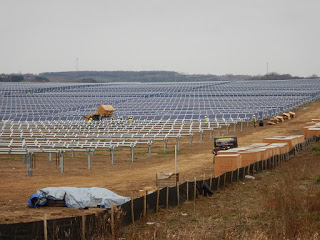
by jboullion | Nov 15, 2016 | Solar, Utility Scale

Anticipating the completion of a dozen solar projects in Wisconsin, La Crosse-based Dairyland Power Cooperative signed contracts this month to add three more arrays to its generation
portfolio. With these three arrays Dairyland now has more 20 MW of solar
generation under contract, almost all of it located in the Badger State
(see table below). These arrays will produce emission-free power for
Dairyland’s 25 member distribution cooperatives and 17 municipal
utilities.
Chicago-based SoCore Energy will build and
own the three new arrays. Two of the three arrays will be located in Wisconsin, and the third will go up in northeast Iowa. SoCore is also the developer of 11 of the initial 12 arrays announced by Dairyland in February.
All 15 arrays are located in the service territories of Dairyland’s member distribution cooperatives. In conjunction with Dairyland’s utility-scale arrays, many of the host cooperatives are adding their own panels to these installations, to serve customers who subscribe to their shared solar programs.
The environmental benefits from these arrays will go beyond clean energy. Every project site will be revegetated with native plants to create bee and butterfly habitat. When revegetation is complete, SoCore will seek certification of its projects as “pollinator gardens.”
One of the projects under construction, St. Croix Electric Cooperative’s Sunflower II array in Roberts, provided the backdrop for a solar media day on Monday, November 14th. RENEW’s Michael Vickerman took part in the open house, providing RENEW’s perspective on the rapid growth of solar generation throughout Wisconsin. The Sunflower II project is about 30 miles east of St. Paul, Minn., and 55 miles west of Eau Claire, Wis.
Of the 45-50 MW of Wisconsin-based solar generating capacity likely to be operational by April 2017, Dairyland’s projects will account for nearly 40% of that total. As of today, the only multimegawatt array producing power under contract to a Wisconsin electric provider is the 2.25 MW installation in Rock County owned by Hanwha Q CELLS USA, which supplies electricity to Wisconsin Power & Light.
For more information on Dairyland’s newest solar projects, see: http://www.dairylandpower.com/dcontent/article/DPCannouncesadditionalsolarcontracts.pdf
As a reminder, Barbara Nick, CEO of Dairyland Power Cooperative, will speak at our 2017 Energy Policy Summit, Clean Energy Goes Mainstream, on January 19, 2017. Learn more and register today!

by jboullion | Oct 25, 2016 | Uncategorized
RENEW Wisconsin sent the below letter of support for the Biomass Thermal Utilization Act, which would extend a 30% investment tax credit to high efficiency biomass thermal energy systems, to Wisconsin’s Senators Baldwin and Johnson, and Representatives Duffy, Grothman, Kind, Moore, Pocan, Ribble, Ryan, and Sensenbrenner.
I am writing to communicate RENEW Wisconsin’s strong support for the Biomass Thermal Utilization Act (BTU Act), sponsored by Senators King and Collins and Congressmen Welch and Gibson. If adopted, the provisions of the BTU Act will help accelerate installation of high efficient biomass thermal systems in communities around the country. This would drive economic development up and down the biomass value chain, including the creation of new jobs to serve the biomass fuel delivery infrastructure needed to supply these systems.
The BTU Act would add biomass thermal energy technologies to Sections 25D and 48 of the tax code, therefore extending a 30% investment tax credit to high efficiency biomass thermal energy systems. This would level the playing field with other renewable energy technologies that already qualify for investment tax credits. While biomass thermal does not need a permanent investment credit, the high initial capital cost is the major obstacle to broader market adoption. The current tax structure is unfair to biomass thermal technologies and is hindering the industry’s growth.
The proposal was scored by the Joint Committee on Taxation at $134 million over 10 years. RENEW Wisconsin supports a 5-year authorization which reduces its estimated cost to the U.S. Treasury to $67 million.
Please vote in support of the BTU Act (S. 727 and H.R. 1145) during the next legislative session, so the biomass thermal energy industry will begin 2017 driving economic development on a level playing field with other renewable energy technologies.
Sincerely,
Tyler Huebner
Executive Director, RENEW Wisconsin
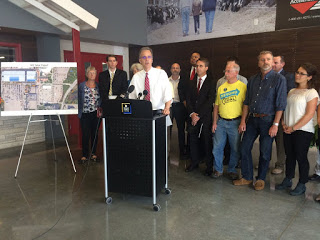
by jboullion | Oct 21, 2016 | Uncategorized
 |
Dane County Executive Joe Parisi announces
solar initiatives for the 2017 budget |
In late September, Dane County Executive Joe Parisi unveiled plans to triple the amount of county-owned solar generation–from 330 kilowatts to 1 megawatt–and convert the county’s main landfill into a source of clean renewable methane for injection into a nearby natural gas pipeline. A portion of the landfill’s output will power 75 heavy-duty vehicles in the county’s fleet by the end of 2017. See the press release here.
In advance of the County Board’s budget hearing on October 19, RENEW expressed its vigorous support for Parisi’s initiative in a letter circulated to Dane County supervisors. Please contact your supervisor and ask him or her to support the clean energy provisions in the 2017 budget proposal.
See our letter of support below:
Date: September 19, 2016
To: Sharon Corrigan
Chair, Dane County Board of Supervisors
Jenni Dye
Chair, Personnel and Finance Committee
From: Tyler Huebner, Executive Director
Michael Vickerman, Program and Policy Director
Re: Clean Energy and Climate Change Provisions in the 2017 Dane County Budget Proposal
We write to communicate RENEW Wisconsin’s strong support for the clean energy and climate-change related provisions that appear in the proposed 2017 budget now before the County Board. If adopted, these provisions would greatly enhance the County’s ability to bring about a clean energy future for its citizens and its own operations. The investments contemplated in the capital budget will reduce energy-related expenses over the long term while generating new revenue streams that can help fund county operations or provide tax relief, while the creation of a new Office of Energy and Climate Change will enable Dane County to coordinate a forward-looking emissions reduction strategy with municipalities and other key stakeholders.
We endorse the following provisions in the capital budget:
1. The investment of more than $2 million to build solar generation systems totaling 770 kilowatts at the Alliant Energy Center and the Dane County Jobs Center. These arrays will reduce pollution from county operations while lowering the county’s electric bills by more than $2 million over 20 years. We note that the County Executive’s office took great care to situate the new solar generating capacity at locations that will generate the greatest monetary savings. Adding the new arrays to its existing portfolio of systems will result in one megawatt of county-owned solar generation, by far the largest commitment of any Wisconsin county to what has become an affordable and locally available source of clean energy.
2. The investment of $18 million on infrastructure to produce pipeline-grade methane from the Rodefeld Landfill and enough compressed natural gas to power 75 county-owned vehicles by the end of 2017. This far-sighted initiative will enable Dane County to convert its Rodefeld facility from an electricity-generating energy center to one that supplies clean methane to a nearby pipeline. Transitioning the energy infrastructure at Rodefeld in this manner will insulate the County from the economic impact of drastically reduced electricity buyback rates in 2018. Indeed, the production of a low-carbon renewable fuel would generate a significant revenue stream likely to offset the initial investment in less than four years. This initiative would further advance the progress Dane County has already achieved in substituting renewable methane for fossil fuels to fuel its fleet of patrol trucks and snow plows.
We endorse the following provision in the operations budget:
The creation of an Office of Energy and Climate Change within the County Executive’s Office. The purpose of this new office is to lead, shape and steer climate change mitigation strategies undertaken by public and private entities throughout the county. Several Dane County communities, most notably Madison, Middleton and Monona, have on their own launched significant initiatives to reduce fossil fuel emissions. The individual hired to staff this office would develop a countywide approach for engaging such stakeholder groups as municipalities, electric providers and businesses. Key near-term objectives for this office will be the formation of a Dane County Council on Climate Change, and the development of an action plan that integrates today’s piecemeal efforts into a coordinated and resourceful program.
The initiatives proposed in the 2017 budget would build upon a record of success in the clean energy and emissions reductions arenas, one that the County Executive and the County Board can take pride in. In recognition of Dane County’s achievements and its desire to lead the way on clean energy development and reducing greenhouse gas emissions, we urge the County Board to approve the budget provisions that will accelerate the momentum already in evidence.
Sincerely,
Tyler Huebner
Executive Director
Michael Vickerman
Program and Policy Director
cc: Dane County Board of Supervisors
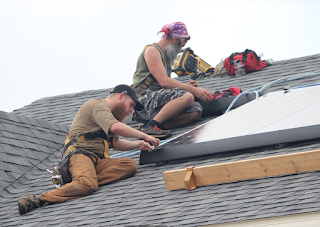
by jboullion | Oct 20, 2016 | Uncategorized
Today, the Public Service Commission of Wisconsin authorized
approximately $7.7 million in rebates spanning 2017 and 2018 to spur small,
customer-based renewable energy projects throughout Wisconsin.
The rebates go to residential, business, and non-profit
customers of eligible Wisconsin utilities, and enable the customers to install
renewable energy technologies including solar, geothermal, biogas, biomass and
small wind systems.
 |
| Full Spectrum Solar installs a solar PV system via the MadiSUN program |
|
Tyler Huebner, Executive Director of RENEW Wisconsin, said,
“From our renewable energy perspective, Chairperson Ellen Nowak may have said
it best in her concluding remarks, stating, ‘This is a great win for
Wisconsin.’ Indeed, continuing the highly successful renewable energy rebates
for 2017 and 2018 is a great win. This
level of renewable energy rebate funding should support upwards of 500 solar
electric home installations, 70 or more home geothermal installations, and
dozens of larger business renewable energy projects for each of the next two
years. The program will help our
residents save money and our companies stay cost-competitive.”
The Commission asked Staff to recommend how the renewables
funding should be split between residential and business projects, as well as a
review of the incentive levels in light of the fact that technology prices for
renewable energy systems, specifically solar electric systems, have been
dropping very quickly in recent years.
RENEW Wisconsin will provide our recommendations, and those of the
renewable energy industry, to Commission Staff in the coming days.
In addition, the Commission will evaluate spending $10-$20
million to expand biogas production from anaerobic digesters on dairy
farms. Staff and program administrators
will be developing biogas program options for the Commission to investigate
within 30 days, along with program options for increasing Focus on Energy’s
energy efficiency and renewable energy impacts in rural Wisconsin.
The Commission agreed to lower its cash reserve from $30
million down to $5 million, which freed up dollars carried over from previous
years to be put into programs starting in 2017.
Huebner said, “We applaud the Commission freeing up millions of dollars
of ratepayers’ money from previous years to be put into programs now that will
enable energy and dollar savings for customers across Wisconsin.
RENEW Wisconsin was the lead advocacy organization promoting
the continuation of the renewable energy rebates. We provided two separate memos describing the
history and status of the renewable energy industry and its relationship with
Focus on Energy and advocating for a continuation of rebates. In addition, a sign-on letter promoting
continuation of renewable energy rebates, which was supported by 41 businesses
and organizations from throughout Wisconsin, was delivered to the PSC as part
of the public comment period in this proceeding.
The PSC had authorized a renewable energy loan program in
2014 and allocated $10 million to it over four years. Today, approximately two years into the
program, the PSC decided to end the program and spend the remaining funds
instead on rebates, which had outperformed the loan program in that two year
period.
Biogas production through anaerobic digesters will also see
a boost. The PSC re-committed to
spending $6.4 million on this technology, which it had authorized in 2014. An initial plan to focus on smaller dairy
farms was not as effective as envisioned.
Today, the PSC authorized the creation of an interagency working group
to identify opportunities to expand this technology and its benefits of
renewable energy production, water quality improvements, and on-farm revenue
stability, and indicated that programs between $10 and $20 million should be
investigated to spur this technology.
In its comments to the PSC, RENEW pointed out that we have
world-class companies working in anaerobic digesters right here in Wisconsin
that can help make this program a success.

by jboullion | Oct 5, 2016 | Uncategorized
 This past Sunday, October 2nd, RENEW Wisconsin hosted our 4th annual Ride with RENEW! While the day started off cloudy and a bit rainy, we finished our 33 mile ride in sunshine. We saw some fantastic renewable energy installations in the Fond du Lac area, and with a deadline of Friday, Oct 7th, we have raised $14,800 towards our $15,000 goal!
This past Sunday, October 2nd, RENEW Wisconsin hosted our 4th annual Ride with RENEW! While the day started off cloudy and a bit rainy, we finished our 33 mile ride in sunshine. We saw some fantastic renewable energy installations in the Fond du Lac area, and with a deadline of Friday, Oct 7th, we have raised $14,800 towards our $15,000 goal!
Thank you to all 202 donors who supported our Bike Ride this year thus far, and if you haven’t yet had the chance, please consider helping us meet the final $200! With that, we will successfully meet our $15,000 fundraising challenge from John and Mary Frantz for the 4th year in a row, bringing our 2016 total up to $30,000 for RENEW Wisconsin! We are honored by the continued generosity of John and Mary, and all our other supporters over the past 25 years.
We continued our trend of increasing ridership each year with a new record high of 41 riders this year! Thanks so much to everyone who turned out on Sunday.
This year, we were lucky enough to have Brian Kolstad of Wisnet.com accompany us as our official photographer, and he got some great shots! We put together an album on Google Photos so everyone can see the highlights of the day.
Special thanks to our sponsors, and also our excellent hosts from Fond du Lac: Jeanne & John McDowell and Tom Schuppe. We couldn’t have done it without all their hard work!
Ride Summary
We began the day with brief overviews of the renewable energy measures taken by UW-Fond du Lac and Fond du Lac High School, which are right next to each other. David Demezas told us how UW-Fond du Lac incorporates a demonstration solar panel into its curriculum, while Margie told us about the process Fond du Lac High School went through to install geothermal heating and cooling at the facility that saves the school $290,000 annually on its energy bill.
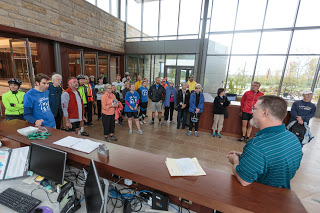
Next, we rode along the freshly completed Fond du Lac Bike Loop to Grande Cheese’s new research center and headquarters. Grande Cheese applied for LEED Gold certification, and we got to tour with Scott to learn about all the energy efficiency measures taken by Grande Cheese. And, it gave us a chance to warm up inside!
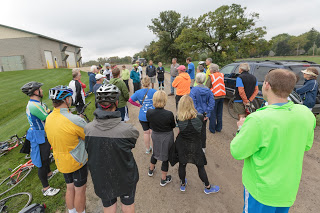
After our tour of Grande Cheese, we stopped at Vir Clar Farm, a 2,000 head dairy farm, to visit the anaerobic digester there. Grant Grinstead, fourth generation owner of Vir Clar Farm, gave us the details on why a digester made sense for his family, farm, and community. The farm is “producing milk and power for America” – enough power for 800 homes.
Then we had our most difficult climb of the day, a ride up the Niagara Escarpment to our lunch destination, Eden Community Center. Thanks to Eden Meat Market Catering for our delicious meals, and to Agnesian Healthcare for sponsoring our lunch!
After lunch we headed to the Cedar Ridge Wind Farm in Eden, WI, owned and operated by Alliant Energy. Brian Dierksheide of Alliant Energy told us about the wind farm, which produces enough energy for 17,000 homes’ annual usage in the area! Brian said throughout the lifetime of the wind farm, it has displaced enough coal to fill a coal train 80 miles long – pretty impressive.
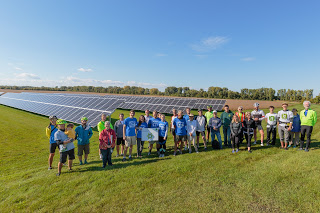
Finally, on our longest leg of the trip, we headed to the Sisters of St. Agnes’ 250 kilowatt solar array. With the sun shining bright for the first time all day, Sister Sue spoke with us about why her congregation decided to install solar, and Jesse Michalski of Eland Electric, who installed the project and sponsored this stop, told us how the project operates.
Overall, it was a great day of riding and renewable energy! A huge thank you to everyone who helped us make this event possible, particularly all our generous donors, John and Mary Frantz for once again providing the match, and our local hosts, Jeanne & John McDowell and Tom Schuppe.
If you donated $35 or more, you are now considered a member of RENEW and we are happy to have you with us. You will receive e-newsletters from us and can keep up to date via our website and blog.
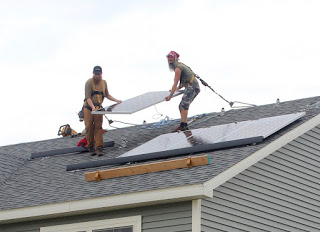
by jboullion | Sep 28, 2016 | Uncategorized
 |
Full Spectrum Solar workers install a solar array for the
MadiSUN Group Buy Program. |
By the end of this year, nearly 100 Wisconsin households will become owners of new solar PVsystems on their rooftops as a result of four group purchase programs initiated in 2016. The communities served by these programs are Milwaukee (and neighboring Shorewood), Madison, Racine and Eau Claire (see table below).
Solar group purchase programs are designed to reduce the cost and complexity of installing solar panels on individual houses. In a typical solar group purchase, a city and/or a community organization works with a single contractor to simplify the site assessment, permitting, installation and interconnection process at a preset price to interested households. By organizing these installations in a single package, the contractor is able to acquire equipment from suppliers at a discount, and pass the savings to the group program participants.
Individual households are invited to attend meetings in and around the community, where they can gather information about the program offerings (including incentives and financing options) and arrange for a free site assessment.
Though not new in Wisconsin, solar group purchasing is having a breakout year this year, due to the convergence of several factors.
– Continued declines in equipment costs;
– An increase in state incentive dollars this year for residential solar installations;
– A judicial decision in October 2015 that invalidated an onerous solar connection charge in We Energies’ territory.
The judicial reversal arose from a lawsuit filed by RENEW and The Alliance for Solar Choice challenging We Energies’ solar charge, which was approved by the Public Service Commission in November 2014. It is hard to overstate the importance of that court decision, since more than 70 of the nearly 100 households participating in community group purchasing programs are customers of We Energies. Had that solar connection charge taken effect in January 2016, the cost of going solar would have risen by 30% in We Energies territory.
Wisconsin’s two largest cities are running their solar group purchases through their respective Solar America programs (Milwaukee Shines and MadiSUN). Milwaukee is partnering with Midwest Renewable Energy Association while Madison has paired up with RENEW. In contrast, local solar enthusiasts such as Tom Rutkowski in Racine, and Steve and Ellen Terwilliger in Eau Claire, took the initiative in organizing SOLARacine and Chippewa Valley Affordable Solar, respectively. Chippewa Valley Affordable Solar, the newest of the four programs to get off the ground, is set to continue operating through 2017. The MadiSUN program is likely to field another group purchase program next year as well.
It is clear that the group purchasing model works in Wisconsin and it is our hope that the successes in 2016 will spur community or environmental organizations elsewhere in Wisconsin to launch similar initiatives in their back yards.
Additional links to media stories about Wisconsin solar group purchase programs:
Racine:
http://journaltimes.com/business/local/racine-solar-group-purchase-set-homes-participating/article_8377b080-e87f-515b-b737-74b314e97ce7.html
Milwaukee:
http://city.milwaukee.gov/MilwaukeeShines/Get-Solar/Solar-Group-Buys.htm#.V-v4xcm6968
http://www.wpr.org/milwaukee-area-residents-finding-way-go-solar-group-buy-program
Racine and Milwaukee:
http://archive.jsonline.com/business/buying-in-bulk-group-effort-helps-bring-down-solar-costs-b99760614z1-386892691.html
Eau Claire:
http://chippewa.com/dunnconnect/business/chippewa-valley-residents-can-join-group-buy-for-solar-installations/article_6b9b6ab0-5c62-5881-bebf-5d10c0c59d9d.html
Madison:
https://madisunsolar.com/
http://host.madison.com/wsj/news/local/hundreds-seek-more-information-on-madisun-solar-group-buy-program/article_058a78f1-9a72-5df6-b6d1-d1e386573b78.html
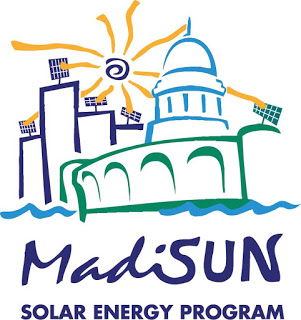
by jboullion | Sep 21, 2016 | Uncategorized
 September 13, 2016 – Madison.
September 13, 2016 – Madison.
Nearly 350 households in the Madison area have signed up to take the first step toward solar power for their homes, exceeding enrollment expectations for the MadiSUN Solar Group Buy Program. The City of Madison announced the Group Buy Program, along with a new Solar Energy Loan, in June of this year.
Twelve households have already signed contracts to install rooftop solar systems, putting the program well ahead of its goal to contract 15 solar systems by November 1, 2016. The solar systems contracted so far represent 55kw of solar electric capacity and over $150,000 in local renewable energy sales.
As MadiSUN approaches the end of its recruitment period on Monday September 19th, program managers remain optimistic that more households will choose to go solar.
“We are really pleased with the level of interest we’ve seen,” said Katherine Klausing, Engagement Manager at RENEW Wisconsin, the nonprofit program administrator. “Madison families recognize that putting solar panels on their homes can lower their energy costs and increase their property values. But it’s also an investment they can be proud to make. This is a step in the right direction.”
Interested households can sign up until Monday September 19 by visiting madisunsolar.com.
The success of the MadiSUN Group Buy comes at a time when cities across Wisconsin are looking at expanding access to solar. Solar group buy programs in Milwaukee, Racine and Eau Claire have also taken off this year. Nationwide, 73 percent of Americans say they want the US to prioritize renewable energy sources like solar and wind over fossil fuels like oil and gas.[1]
Many households are investing in solar to help their personal finances—a typical 4kw system can save a household over $1,700 in energy costs for each year of its 30-year life. But local solar energy businesses are also seeing a boost to their bottom lines.
“The MadiSUN Group Buy has been great in helping in us grow our business,” said Burke O’Neal of Full Spectrum Solar, a Madison-based solar installer selected to serve the group. As a result of the surge in new business, Full Spectrum Solar has hired an additional full-time staff member in its office and several part-time installers for its field crews.
Approximately 70 households have already taken advantage of a free solar property assessment, with dozens more scheduled this fall.
Madison resident Brian Lavendel is installing solar panels for himself and his neighbors, who rent the other part of Lavendel’s 2-unit home. “It was easy—it was like one-stop shopping. I attended an information session, which was particularly helpful because it brought together all of the pieces—the Group Buy, the federal tax credit, and the Focus on Energy program—so I got all of my questions answered. The fact that it was a Group Buy, with terms all set up, helped too. I didn’t have a lot of time to research the different companies and panels. I knew that RENEW Wisconsin had already negotiated on my behalf, so to speak,” Lavendel said. “This is something I’ve thought about for a long time. The low price of the panels and the increased efficiency in their energy production made it feasible. I probably could have done it earlier, but the MadiSUN program made it easy.”
Program Background: The MadiSUN Group Buy for Rooftop Solar program enables Madison residents to “go solar” together. The program selected Madison-based business Full Spectrum Solar to serve the group. The City’s investment in marketing and competitive bidding drove down the cost for each participant, resulting in savings of about 14 percent.
The cost of installing solar has never been lower, as homeowners can receive a Federal Tax Credit for 30 percent of the system cost, while Wisconsin’s Focus on Energy program offers up to $2400 in rebates for installing solar.
Madison Mayor Paul Soglin launched the programs in June as part of the City of Madison’s broader efforts to be more reliant on renewable energy sources. “These programs are going to be a financial win for all of us,” said Mayor Soglin in June as he launched the MadiSUN program. “They’re going to be a financial win for those who invest in solar and they’re going to be a financial win for our larger community.” In June the City passed an energy plan that seeks more renewable resources and proposes an inventory of city-owned land for solar energy development.

by jboullion | Sep 19, 2016 | Uncategorized
Milwaukee Journal Sentinel reporter Tom Content concludes that Wisconsin’s PSC has been far more generous to utility requests to raise monthly fixed charges on customers than regulators in other states. His article relies on research and testimony that RENEW Wisconsin submitted in Alliant Energy’s pending rate case, which contains a proposal to increase the fixed charge on residential customers from $7.56 today to $18 in 2018. In our direct testimony, RENEW urges the PSC to cap any increase approved at no more than $12/month, in line with the fixed charges assessed on residential customers in Sun Prairie and Stoughton, which are both served by municipal electric utilities surrounded by Alliant.
Read the full article online here, or below.
As Alliant Energy Corp. seeks to more than double its fixed customer charge on monthly electric bills over the next two years, a review of rate cases around the country finds that regulators in other states are taking a dimmer view of these proposals than Wisconsin.
Critics say the proposals to increase fixed fees, also known as monthly customer charges, penalize apartment dwellers and those who have taken steps to conserve energy. Utilities say they’re a fairer way to pay for the utility system.
Over the past two years, Wisconsin utilities have been aggressive in seeking big expansions of the customer charge, and the state Public Service Commission has been receptive, granting average increases of about 66%.
But around the country, as the issue has received more attention, 48 different utilities that have proposed to increase the fixed charge by at least 52% have had to settle for about one-fourth of that — just a 14% increase.
The increases represent a strategy that utilities turn to as a way to boost revenues at a time when electricity sales growth has flattened, with the prevalence of energy-saving devices and efforts by some customers to conserve to keep costs down.
Utilities say they’re trying to have the fixed portion of the bill start to represent parts of the utility system that don’t fluctuate with the price of energy. But consumer advocates say the changes penalize those who use little energy or have taken steps to conserve.
A key bone of contention between utilities and their critics is whether these fixed charge hikes pose a chilling effect on whether to conserve energy.
However, what is clear is that electricity customers who do not use a lot of energy face the biggest percentage price increases from moves to hike fixed charges.
An analysis of the impact of the rate changes proposed by Alliant’s Wisconsin Power and Light utility shows how the proposed charges would affect different kinds of customers. Under Alliant’s proposal, a customer who uses a typical amount of electricity every month would see fees increase of about 5% by 2018.
But a customer in a very large home, using twice as much power each month, would see bills drop by 1% by 2018. And someone who uses half as much power as the typical customer, whether living in a small apartment or having taken steps to cut back on power use, would see a much bigger increase of 17% in monthly bills.
Apartment dweller Hank Jacobi in Milwaukee says customers should be aware of the impact of fixed charges. He recalls when the We Energies charge was just 20 cents a day, and now it’s 52.
Jacobi spent more than two months in the hospital after a bicycle crash. When he returned home, he found that his monthly bill had gone up by about 26%.
“When I was away form home for 82 days, the fixed charge was still getting me,” he said. “It’s the charge you cannot avoid, no matter how many lights go off.”
Jacobi said it’s not that he can’t afford to pay more. But the 75% increase granted to We Energies in 2014 adds up to $82 a year for him.
“I know an awful lot of people in the city are in tough shape. For them to pay that much more a year, it’s going to hit hard,” Jacobi said. “They’ve been cut left and right, up and down.”
In a case now pending in Madison, Alliant Energy’s Wisconsin Power and Light Co. utility contends that recent PSC decisions involving other utilities show that its own fixed charge is well below the pack. After recent increases, Alliant’s fixed charge stands at just $7.67, well below We Energies ($16 a month), Madison Gas & Electric Co. ($19) and Wisconsin Public Service ($21).
Alliant’s proposal calls for more than doubling the charge, starting with a 56% increase in the customer charge in 2017, to $12 from $7.67. That would be followed by a 50% increase, to $18 a month, in 2018. The total increase: 135%.
“While the customer-charge change will increase bills for low users and decrease bills for high users, the change itself is neutral for the average customer,” Brian Penington, director of regulatory affairs at Alliant, said in a filing with the PSC. “On the whole, residential customers will experience a small increase … but WPL’s residential rates will continue to be among the lowest rates for Wisconsin’s large investor-owned utilities.”
Other states are taking a more skeptical view of fixed-charge increases, with some regulators rejecting any increase because it would discourage energy conservation.
Since 2014, 48 utilities in states other than Wisconsin have proposed to increase their fixed charges, by an average of 53%. A review of regulators’ decisions, compiled by the advocacy group Renew Wisconsin, found that commissions kept half of those fixed charges unchanged, and the average increase was 16%.
Inside Wisconsin, the PSC has approved much larger increases, with utilities seeking 96% on average and receiving 66%. But the commission in recent cases has given the utilities somewhat less, Renew Wisconsin says.
The utility says the cost of equipment to connect customers to the power grid has risen over the years, but its customer charge has remained in the range of $5 to $8 a month for more than two decades.
“Because we collect more of the power grid’s overall costs in the per-kilowatt-hour charge, and because we haven’t raised our fixed charge in many years, over time low-use customers have begun to pay less than what it costs to serve them,” said Annemarie Newman, a spokeswoman for Alliant.
A majority of the lowest energy users on the Alliant system are either vacation homes or cottages, according to the utility.
This is the first request by Alliant to change base electric rates since 2010, Newman said
Renew Wisconsin policy director Michael Vickerman said the increase “puts a larger portion of customer bills off-limits to potential savings from actions initiated by customers” to make their homes more energy efficient or to add solar power.
Renew urged the commission to cap Alliant’s fixed charge at $12 a month, which still would be a more than 56% increase from the current fee.
Jonathan Wallach, representing the customer group Citizens Utility Board, recommended the PSC limit Alliant’s customer charge to $9.
Nearly 100 Alliant customers have weighed in against the utility’s proposal in public comments filed with the commission. A public hearing is scheduled for Sept. 28 in Madison. A decision by the PSC is expected late this year.
Alliant has about 465,000 electricity customers across the state, mainly in southern and central Wisconsin.
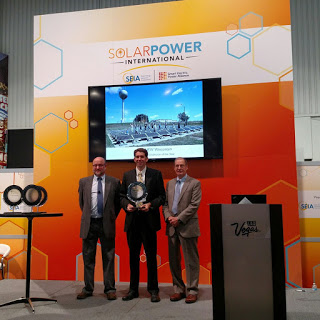
by jboullion | Sep 14, 2016 | Uncategorized
 |
RENEW Wisconsin’s Executive Director Tyler Huebner
receiving the Regulatory Champion of the Year award. |
RENEW Wisconsin has been honored as the 2016 “Regulatory Champion of the Year” by the Interstate Renewable Energy Council (IREC), a national organization working on the advancement of clean energy.
The award was given at the annual Solar Power International conference in Las Vegas on Tuesday night.
RENEW won this people’s choice award for leading the campaign to overturn a proposal by We Energies, Wisconsin’s largest electric utility, to charge extra fees to customers who generate power for their own use from sources such as solar panels. These so-called “connection fees” would have amounted to approximately $20 per month for a typical residential solar customer, and thousands of dollars per month for dairy farmers who generate electricity from cow manure.
After the Public Service Commission of Wisconsin (PSCW) approved We Energies’ unprecedented proposal in November 2014, RENEW Wisconsin partnered with The Alliance for Solar Choice, a national solar advocacy organization, to challenge the PSCW’s decision in Dane County Circuit Court.
In October 2015, Judge Peter Anderson ruled that there was not sufficient evidence in the regulatory proceeding to justify the agency’s decision allowing We Energies to impose additional fees on that subset of customers who produce power for their own use, giving RENEW Wisconsin and TASC the legal victory.
IREC’s 2016 3iAwards honor innovation, ingenuity, and inspiration from the nation’s best in both renewable energy and energy efficiency. This year, over 1,000 people voted for the finalists in the People’s Choice awards, which was “an impressively distinguished group of meritorious projects and acclaimed people” according to IREC’s website.
“Not only does renewable energy help citizens and businesses save money on their energy bills, it also drives economic expansion and creates family-supporting jobs. The solar industry alone now has over 200,000 employees nationally. Our legal victory protects the ability of citizens and businesses to use the sunshine striking their rooftops to reduce their electricity bills, and fuels growth in Wisconsin’s solar and renewable energy markets. We are honored to receive this recognition from an esteemed national organization and based on the popular support of our members and experts within our field,” said Tyler Huebner, RENEW Wisconsin’s Executive Director.
See all the IREC 3iAward winners here.




